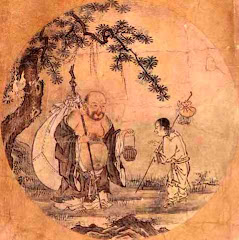
In the West they have been emphasizing morality. When for the first time the Upanishads of the East were translated into Western languages the scholars were puzzled, because they didn't have anything like the Ten Commandments in the Upanishads -- "Don't do this, do that" -- nothing was there. They were puzzled. How are these Upanishads religious scriptures? Because religion means a morality, religion means,
"Don't do this and do that," it is a DOING. And the Upanishads don't talk about what to do, they only talk about how to be, what to be.
The 10 Commandments
====================
ONE: 'You shall have no other gods before Me.'
TWO: 'You shall not make for yourself a carved image--any likeness of anything that is in heaven above, or that is in the earth beneath, or that is in the water under the earth.'
THREE: 'You shall not take the name of the LORD your God in vain.'
FOUR: 'Remember the Sabbath day, to keep it holy.'
FIVE: 'Honor your father and your mother.'
SIX: 'You shall not murder.'
SEVEN: 'You shall not commit adultery.'
EIGHT: 'You shall not steal.'
NINE: 'You shall not bear false witness against your neighbor.'
TEN: 'You shall not covet your neighbor's house; you shall not covet your neighbor's wife, nor his male servant, nor his female servant, nor his ox, nor his donkey, nor anything that is your neighbor's.'
Small teachings tell you what to do, what not to do. They give you ten commandments: "Do this, don't do that" -- small teachings. A great teaching doesn't give you any commandment. It is not concerned with what you do, it is concerned with what you are. Your being, your center, your consciousness -- that is the only thing significant.
The Ten non-commandments
========================
The first: freedom.
The second: uniqueness of individuality.
The third: love.
The fourth: meditation.
The fifth: non-seriousness.
The sixth: playfulness.
The seventh: creativity.
The eighth: sensitivity.
The ninth: gratefulness.
Tenth: a feeling of the mysterious.
Anything practiced is false, pseudo. And you have been told by all your religions to do this, not to do that; you are all carrying ten thousand commandments. But because they have not arisen from your own being, they are just a burden. They don't make you free, they make you Hindus, they make you Mohammedans. They make you Buddhists, they make you Christians, but they don't make you divine beings.
Ten Commandments are just a very small by-product of the Ten non-Commandments.
Morality has nothing ultimate in it. That's why every society has its own morality, every culture has its own morality. One thing can be moral in India and immoral in America; another thing can be moral in America and may be immoral in India. If morality was really real, then it could not differ.




No comments:
Post a Comment